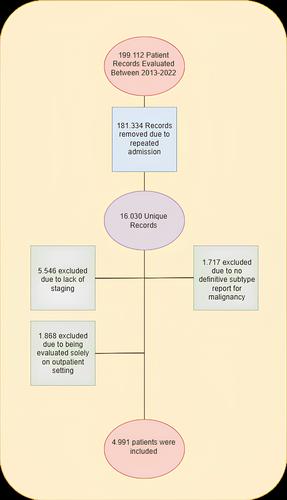Reimbursement of Lung Cancer in Turkey: A 10-Year Single Center Study
Abstract
Objective and Background
Lung cancer is the most common carcinoma reported worldwide. The burden of lung carcinoma on healthcare has been reported in many countries, while a real-life report within Turkey has yet to be published. This study aims to present the available results from a tertiary center specializing in pulmonology.
Methods
The study's population consisted of 199.112 patient admissions, which were reimbursed under the national healthcare system. After exclusion criteria, 4.991 patients were evaluated in the study. The patient's demographic data, malignancy types, diagnostic methods for lung carcinoma type and staging, and treatment modalities were recorded.
Results
The average healthcare expenditure during the treatment duration was 4289.4 (± 3739.4) USD, and the median was 3219.9 USD. The average expenditure was higher for male patients (3260 to 2977 USD, p = 0.003). Survivors had an overall lower healthcare expenditure than the non-survivor group (2865 to 4230 USD). Patients with locally advanced disease classification also had a higher expenditure on other stages (p < 0.001). This was not present in SCLC, as those diagnosed with SCLC had the most expenditure at the limited stage (p < 0.001). Carcinoid tumors had the least expenditure compared to other subtypes at limited and advanced stages (p < 0.001). SCLC had the highest expenditure requirement at the limited stage (p < 0.001). At the locally advanced stage, large cell carcinoma, SCC, and adenocarcinoma were the subtypes requiring the highest expenditure (p < 0.001).
Conclusion
The parameters affecting overall cost were age, gender, stage, and malignancy subtype. The healthcare expenditure was also affected by the difficulty of diagnosis, with the non-diagnostic patient group having an overall higher cost. A longer duration of hospitalization and treatment given on an inpatient basis also contributed to a higher cost of care.


 求助内容:
求助内容: 应助结果提醒方式:
应助结果提醒方式:


